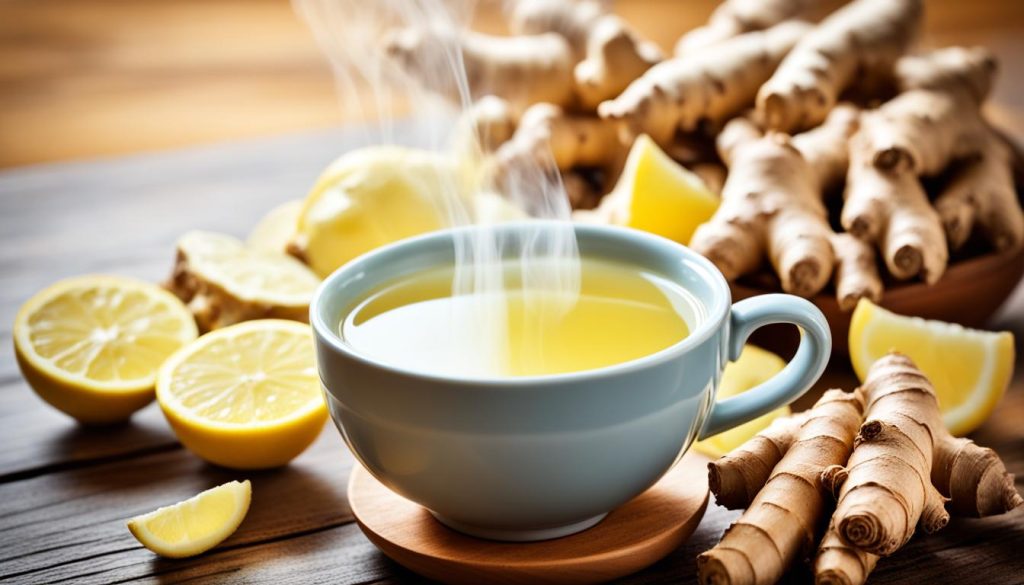I love exploring new foods and their health perks. Ginger is one spice that really stands out. It comes from Southeast Asia and is used in many dishes worldwide. It adds a unique taste to everything from tea to stir-fries and baked goods.
Ginger is a plant that is related to turmeric and cardamom. It’s known scientifically as Zingiber officinale. The part we use most is the rhizome, or underground stem. But the whole plant is full of health benefits that people have known about for a long time.
Ginger is great because it fights inflammation and has antioxidants. It can help with nausea, weight loss, and even diabetes. Adding ginger to your diet can be a tasty way to stay healthy. You can enjoy it in tea or use it in many recipes.
What is Ginger?
Ginger is a root that has caught the eye of food lovers and health experts around the world. It comes from Southeast Asia and is part of the Zingiberaceae family. This family also includes turmeric, cardamom, and galangal. The main part of ginger is its underground stem, known as the ginger root.
Ginger root is loved for its spicy and sweet flavors. Its scent and taste make ginger ale, tea, candies, and many Asian dishes special. Whether you’re drinking ginger tea or eating a ginger cookie, it adds magic to food.
Exploring the Diverse Uses of Ginger
Ginger is not just for cooking. It’s also known for its health benefits, making it popular among those who like natural remedies. It can help with digestion and might even help with weight control. Ginger tea is especially liked for its calming effects.
| Ginger Tea Benefits | How to Make Ginger Tea at Home |
|---|---|
|
|
Ginger is great for those who love spicy and sweet foods or who want to try ginger tea for health reasons. This root is a gem in both the kitchen and for health.
Potent Anti-Inflammatory and Antioxidant Properties
Ginger is known for its amazing anti-inflammatory and antioxidant traits. It has a special compound called gingerol. This molecule is key to ginger’s health benefits. It helps lower inflammation and oxidative stress in the body.
Inflammation leads to many health problems, like chronic pain and arthritis. Ginger’s antioxidants fight free radicals. These are unstable molecules that can harm cells. Ginger’s antioxidants keep your health in check.
Ginger might also help with inflammation from conditions like rheumatoid arthritis. If you have joint pain or want to fight inflammation, ginger is a tasty choice. It’s a spicy and sweet way to boost your health.
| Bioactive Compound | Key Benefits |
|---|---|
| Gingerol |
|

“Ginger’s antioxidants can help manage free radicals, which are compounds that can damage cells when their numbers grow too high.”
Ginger for Nausea and Vomiting
Ginger is a spice known for its unique taste. It’s often used to help with nausea and vomiting. If you’re feeling sick during pregnancy or after surgery or chemo, ginger might help.
Ginger has special enzymes that calm a sick stomach. These enzymes help with motion sickness or morning sickness. Studies say ginger works as well as some medicines for nausea and vomiting. It’s a natural way to feel better.
Ginger Tea: A Soothing Remedy
Making ginger tea is a simple way to use ginger for nausea. Just peel and slice a ginger root, then steep it in hot water for 5-10 minutes. You can add honey or lemon for taste and extra health benefits.
Drinking ginger tea can quickly ease an upset stomach. It helps with nausea and vomiting too.
| Ginger Tea Benefits | Ginger Tea Preparation |
|---|---|
|
|
If you often feel nauseous or have stomach problems, ginger could be a good option. Adding ginger to your daily routine can help with nausea. Enjoy the benefits of ginger tea at home.
Aids in Weight Loss
Ginger is a tasty and fragrant root that helps with weight loss. Studies show it can cut down body weight and waist-hip ratio in those who are overweight or obese. It does this by fighting inflammation, which is important for managing weight.
Ginger makes your body warmer, which helps burn more calories. It also helps control insulin levels and supports recovery after exercise. Adding ginger to your meals can help you lose weight.
Ginger’s Multifaceted Approach to Weight Loss
- Reduces inflammation, a key driver of weight gain
- Boosts metabolism through its thermogenic properties
- Helps regulate insulin levels and supports workout recovery
| Ginger Supplementation | Body Weight Reduction | Waist-Hip Ratio Decrease | Hip Ratio Improvement |
|---|---|---|---|
| Yes | Significant | Significant | Significant |
| No | Minimal | Minimal | Minimal |
Ginger is a natural way to help you lose weight. Add it to your meals for a boost. It can lead to a healthier lifestyle.

“Ginger’s ability to reduce inflammation and boost metabolism can be a game-changer in one’s weight loss journey.”
Relieves Osteoarthritis Symptoms
Ginger is more than just a spice that makes food taste great. It might also help with the pain of osteoarthritis (OA). OA is a condition that makes joints hurt and stiff, making everyday tasks hard.
A review of studies found ginger could lessen pain and help people move better with OA, especially in the knees. Ginger’s anti-inflammatory and antioxidant powers help fight inflammation and stress in OA.
But, not all studies agree on ginger’s benefits for OA. Some didn’t see much improvement. Some people also got stomach issues or didn’t like ginger’s taste, so they stopped using it.
If you think ginger could help with OA, talk to your doctor first. They can tell you the right amount to take and how to take it safely. They can also help with any side effects or interactions with other medicines.
Research on ginger and OA looks promising. But, we need more studies to be sure of its benefits. Always be careful with natural remedies and talk to a doctor before trying them.
Ginger and Diabetes Management
For people with type 2 diabetes, ginger might be more than just a spice. It could help lower blood sugar and make insulin work better. Studies show ginger might have special benefits for diabetes.
A 2015 study in Complementary Therapies in Medicine looked at 41 people with type 2 diabetes. They took 2 grams of ginger powder every day. This helped lower their fasting blood sugar and HbA1c levels, which is important for controlling blood sugar over time.
A 2022 review in Nutrients also found ginger can lower HbA1c levels in type 2 diabetes. But, it didn’t prove it can lower fasting blood sugar.
Potential Mechanisms of Action
Ginger has antioxidants and anti-inflammatory compounds like gingerol. These might help with diabetes. By fighting inflammation and oxidative stress, ginger could make insulin work better and help manage blood sugar.
| Ginger and Diabetes: Key Findings | Results |
|---|---|
| Reduction in Fasting Blood Sugar | Significant reduction observed in a 2015 study |
| Improvement in HbA1c Levels | Consistent reduction in HbA1c found in multiple studies |
| Potential Mechanisms | Anti-inflammatory and antioxidant properties of ginger compounds |
Research on ginger and diabetes is promising, but we need more studies. People with diabetes should talk to their doctor before trying ginger or other supplements.

Improves Digestion and Treats Chronic Indigestion
Ginger is more than just a spice for our spicy and sweet treats. It’s a root that helps with digestion and treats chronic indigestion. This issue affects millions of people around the world.
Ginger has enzymes and compounds like gingerol that help with digestion. These can make food move faster through the stomach. This helps reduce symptoms like bloating and nausea.
“Ginger’s natural enzymes help relieve indigestion, nausea, and bloating, promoting overall digestive health.”
A study showed ginger helped with indigestion before a meal. It was better than a placebo for people with indigestion. Ginger can be a natural way to ease indigestion.
Ginger Tea: Benefits and How to Make it at Home
Making ginger tea is easy and fun. It’s a great way to use ginger daily. The tea is warm, spicy-sweet, and helps with digestion.
- Start by grating or chopping a 1-inch piece of fresh ginger root.
- Add the ginger to a mug and pour in hot water. Let it steep for 5-10 minutes.
- Add a bit of honey or lemon juice to sweeten the tea if you like.
- Drinking ginger tea after a meal can ease digestion and reduce bloating.
Adding ginger to your daily routine can boost your digestion. It can also reduce chronic indigestion and support your gut health.
Menstrual Pain Relief
Ginger is not just tasty but also has amazing health benefits. It can help ease menstrual pain and discomfort. Ginger’s soothing properties can change the game for those with menstrual cramps and premenstrual issues.
Studies show ginger can be as good as some pain meds for easing menstrual cramps. This is thanks to its anti-inflammatory and pain-relieving effects. These effects help with muscle spasms and uterine contractions that cause pain.
Ginger does more than just ease pain. It can also help with mood swings and irritability. Ginger promotes calmness and balance during the hormonal changes of the menstrual cycle. Enjoy ginger tea or add it to your favorite treats for a natural way to handle menstrual challenges.

“Ginger’s natural soothing properties can be a game-changer for those who struggle with the unpleasant symptoms of dysmenorrhea (menstrual cramps) and other premenstrual issues.”
Want to use ginger for menstrual pain relief? Try adding it to your self-care routine. Enjoy a warm ginger tea or try ginger in your recipes. Remember, everyone is different. Always listen to your body and talk to a healthcare professional if you have concerns.
Cholesterol-Lowering Potential
Ginger is a tasty root with a zesty kick. It’s gaining attention in health circles. It could help lower cholesterol levels. A 2022 review of 26 studies showed ginger can cut triglycerides and LDL (bad) cholesterol. It also raises HDL (good) cholesterol.
Even small amounts of ginger, under 1,500 mg a day, can help. This is great for heart health. High LDL cholesterol raises the risk of heart disease.
Ginger’s ability to lower cholesterol comes from its bioactive compounds. These include gingerol, which fights inflammation and oxidation. This can help balance your cholesterol levels.
| Cholesterol Metric | Effect of Ginger Consumption |
|---|---|
| Triglycerides | Significant reduction |
| LDL (Bad) Cholesterol | Significant reduction |
| HDL (Good) Cholesterol | Significant increase |
Adding ginger to your diet can be a natural way to support heart health. You can enjoy it in spicy treats or as ginger tea.
“Ginger’s cholesterol-lowering potential may help reduce the risk of heart-related issues.”
Anticancer Properties
Ginger is a spicy and sweet treat that might help fight cancer. Studies show ginger’s compounds, like gingerol, could lower cancer risk. This includes cancers like colorectal, pancreatic, and liver cancer.
In one study, 20 people at high risk of colorectal cancer ate 2 grams of ginger every day for 28 days. They had fewer signs of cancer in their intestines.
Human studies are still limited, but lab and animal research is promising. Ginger’s antioxidants and anti-inflammatory effects might stop cancer cells from growing and spreading. It could also make cancer treatments work better.
When you drink ginger tea, you might be enjoying more than just its taste. Ginger could be a key to fighting cancer. We need more research, but ginger’s potential is exciting. Keep an eye on it as scientists learn more about its benefits.

